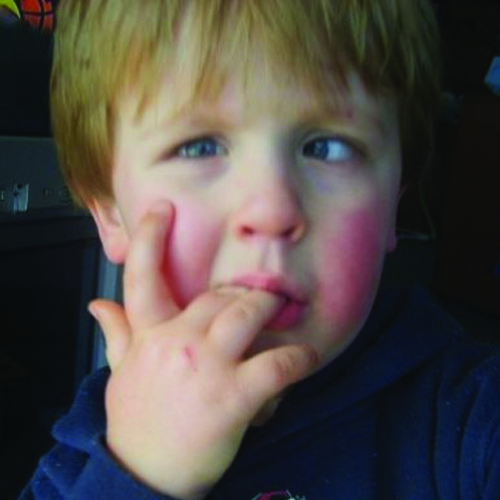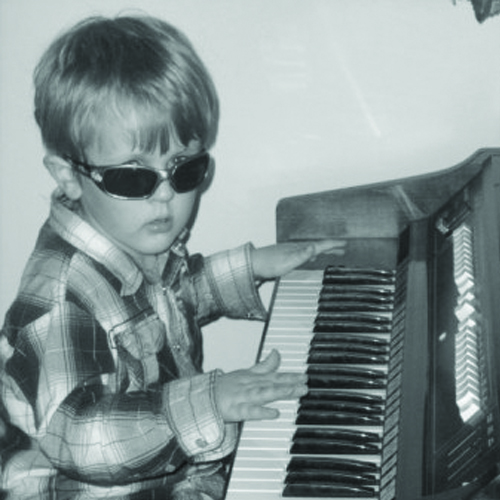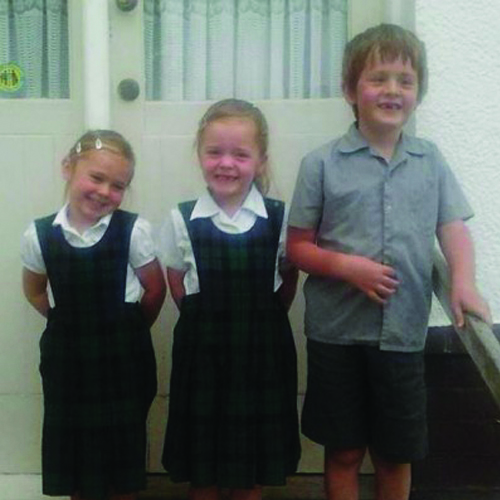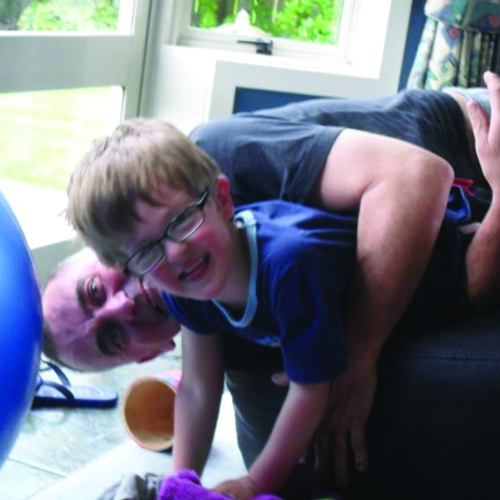Our Stories
An extremely worthwhile journey
Kate McAnelly, an Invercargill early childhood student teacher and IEAG committee member tells of her family’s journey to find an inclusive education for her son.
Our journey towards learning what constitutes a truly inclusive education for children with disabilities began when our son, Stephen, started at a local preschool just before his 2nd birthday. It was becoming increasingly obvious that something was amiss developmentally with our boy, however, without an official diagnosis, the preschool was left to fend for itself, to educate and care for a child who most definitely marched to the beat of his own unique drum.
Early Childhood Years
Diagnoses of autism and vision impairment were made a few months after Stephen turned 3. At that point, Special Education and BLENNZ both came on board the support team. The aim was that together with the preschool, my husband and I, our wider family, and other education and health professionals, we could begin to establish a basis on which we could build a solid inclusive education for Stephen. This would enable him to thrive and achieve the fullest extent of his potential – whatever that picture looked like for him – while learning alongside his peers in an everyday ECE setting.
However, our experience of inclusion at preschool was a bit hit and miss. The preschool itself was part of a large corporation that appeared to regard children as numbers that generated funding, rather than citizens with voices worth listening to, and valuable contributions to make. Most teachers tried their best to include Stephen and understand and cater to his needs, which at the time were quite time-intensive. I thought this was no mean feat when I considered that they had probably had zero to minimal learning about disability and inclusion when studying towards their teaching qualifications.
There certainly wasn't any specialised professional development on offer either, that would have enabled the teachers to broaden their knowledge base and practical skills when teaching children with disabilities. Some teachers considered Stephen a frustrating, time-consuming nuisance (it's amazing how alert you become to idle gossip, comments muttered under the breath and facial expressions when you're the parent of a child with disabilities!). Fortunately, they were few and far between.
The Search for a School
About a year before Stephen turned 5, we began looking at potential schools for him. We really didn't know where to begin. All we knew was that we wanted him to be at an everyday school where he could learn and grow alongside his peers, not in a special needs unit attached to an everyday school, and especially not at our local special school (although he 'qualified' to go there, the mere idea of it was anathema to me).
Stephen's early intervention teacher advised us that, if it were possible, the school should also be a good fit for our two preschool-aged daughters who would go there too in due course. I began by e-mailing a number of different schools, explaining our situation and asking if we could please come and check the school out. I only heard back from one school, which was non-committal about the idea of having a child with autism there, and the other schools I followed up with phone calls showed much the same attitude – we'll take him if we have to, but we don't really want to.
I was so angry – these schools were legally obliged to enrol Stephen if we so chose, but they were already making it abundantly clear they didn't want him there before even having a chance to meet or get to know him.
Eventually, we sat down with Stephen's early intervention teacher and drew up a shortlist of three potential schools (the schools I had previously contacted, for obvious reasons, didn't make the cut) – the moderately-sized public school closest to our house; a moderately-sized high-decile public school in another area of town; and a small Catholic school in the centre of town. The early intervention teacher made the appointments for us to go and check the schools out, and also came with us when we did so, which was something I appreciated greatly as she knew I had a mind bursting with questions I might not always recall.
The first visit was to the moderately-sized public school near our house. Although the principal was guardedly polite, I got an overwhelming initial impression that they weren't interested in having Stephen be part of the school, and seemed to be just going through the motions of talking to us because the early intervention teacher was there.
Our decision was made for us when they began discussing the bullying culture that was endemic at the school, one which they were trying to turn around with little success but they were sure Stephen would be alright...uhhhhh what? You don't see a big problem in a vulnerable child with autism + playground/in-class bullying? I still remember my husband and I whispering to each other out the side of our mouths, cowboy style “no way is Stephen going here!” as we walked out to our car.
I was despairing we'd ever find a suitable school that would share the vision we had, and have, of our son as a human being first and foremost, with rights, dignity and agency, someone who is a competent and capable learner and communicator. I was not to find this shared vision at the next school either, the moderately-sized high- decile public school in another area of town.
The principal was interested in Stephen's potential enrolment, far too interested in fact. All they talked about was the extra funding and support they would get as a result of having another ORS funded student at the school. Stephen was openly discussed by them as a mere number that would bring in money. That turned me off immediately. I didn't care about the quality of the education that was no doubt on offer at the school; I absolutely refused to contemplate sending Stephen there when that was their attitude.
Finally, we got to the last school, St Joseph's School, a year 1-6 school in the centre of town that had come recommended to me by several people, so I thought it fair we should at least check it out. It's fair to say that I wasn't feeling particularly hopeful after our impressions of the last two schools. Fortunately, my fears were unwarranted.
Finding Inclusion
We met with the principal, who was delighted we were considering the school, telling us that Stephen would be a welcomed and loved member of the school community, like every other child who attended. The school felt confident they could meet Stephen's needs alongside those of his peers in the classroom. We took a look through each of the rooms, and saw real inclusion in action in each and every one of them – children who were hearing impaired, vision impaired, had a first language that wasn't English, and had various learning disabilities were all fully included in class life.
As we went on our tour around the school, we continued seeing children's membership and participation rights validated and realised. All the teachers, even those Stephen wouldn't ordinarily come into contact with in the senior school, were happy and willing to learn more about what made Stephen 'tick', and differentiate instruction to suit. They had enthusiastic and experienced teacher aides that would assist the main classroom teacher in helping Stephen to fulfil the fullest extent of his potential.
It was a small school – only 80 children then, although the roll has grown to approximately 110 now – and an additional small detail that didn't go unnoticed by us, that perhaps doesn't register on the radar of other parents, was that the school was fully fenced, so Stephen could play safely outside with his peers. We duly enrolled him, thoroughly impressed by all we had seen, and Stephen started there with ORS high needs funding in place in August 2011.
It's been nearly 3 years now since Stephen first started at St Joseph's, and we remain as pleased with our decision to send him there now as we were back then. He is absolutely thriving, and has come ahead in huge leaps and bounds in terms of his ability in literacy and numeracy – he loves to read and is doing so near to his chronological age level, and he especially loves maths. His handwriting skills in line with his fine motor skills still aren't flash, but are improving, aided by laptop and iPad programmes he is very interested in and motivated by.
Enabling Success and Achievement
Stephen spends the first half of his day at school with his equivalent academic cohort, then spends the last half with his peer age group, which works really well. At all times he is taught by teachers who consider his needs as having equal importance alongside those of his peers, rather than retrofitting them as an afterthought later, acknowledging that this approach benefits all the children. The teachers constantly consider how sounds, smells, lighting and seating can affect Stephen's performance in the classroom. They actively seek any and all possibilities for professional development (formal and informal) around autism.
They've built in big movement breaks into his day, because he really enjoys the feeling moving around vigorously gives to his body, and is better able to concentrate in class afterwards. Where Stephen is unable to sit at a desk and complete work in the traditionally expected way - which is usually down to being unable to cope with the level of noise the other children are making - they are more than happy for him to retreat to a specially designated space in the classroom that is his and his alone (this is currently the inside of a large box he has decorated himself, and has been furnished inside with a large cushion and blanket), where he completes the work under his own steam.
Classroom teachers differentiate instruction for Stephen as and when necessary, and allow him to represent his knowledge in a variety of meaningful ways. They have been known to adopt a learning focus or two in the classroom to take in Stephen's current special interest – last year, they did a creative writing unit that was based on The Gruffalo, which is one of Stephen's favourite books. They are constantly thinking of diverse ways to effectively engage Stephen in his learning, which has meant establishing really good reciprocal channels of communication between home and school.
They have educated and continue to educate the entire school about autism and the right Stephen has to learn alongside his peers in class, which has gone home with children and returned to me at school at pick-up or drop-off time, with parents and families as well as the children themselves asking lots of genuine questions about autism and disability in general. Stephen plays a full part in the life of the school, participating in anything and everything that takes his fancy (his turn as a skeleton in last year's school production was a particular highlight, much applauded by everyone in attendance!). He is honoured as having equal worth to that of his peers, and is a much loved active member of the school community. I couldn't ask for much more really.



